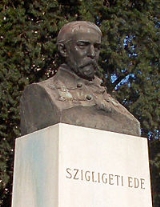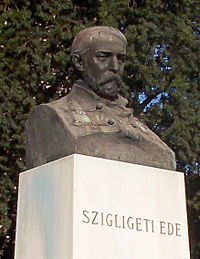
Ede Szigligeti
Encyclopedia
Ede Szigligeti was a Hungarian
dramatist.
 He was born József Szathmáry, at Nagyvárad-Olaszi
He was born József Szathmáry, at Nagyvárad-Olaszi
(presently Oradea
, Romania
). His parents would have made him a priest; he wanted to be a great doctor; finally he entered the office of an engineer. But his heart was already devoted to the drama and, on 15 August 1834, despite the prohibition of his tyrannical father, he actually appeared upon the stage at Budapest
. His father thereupon forbade lim to bear his name in future, and the younger Szathmary henceforth adopted instead the name of Ede Szigligeti, the hero of one of Sandor Kisfaludy
's romances.
He supported himself for the next few years precariously enough, earning as le did little more than twelve florins a month, but at the same time he sedulously devoted himself to the theatre and sketched several plays, which differed so completely from the "original" plays then in vogue (The Played-out Trick actually appeared upon the boards) that they attracted the attention of such connoisseurs as Vorosmarty and Bajza
who warmly encouraged the young writer. In 1840 the newly founded Hungarian Academy crowned his five-act drama Rosa, the title-role of which was brilliantly acted by Rosa Laborfalvy, the great actress, who subsequently married Maurus Jokai.
Szigligeti was now a celebrity. In 1840 he was elected a member of the Academy and in 1845 a member of the Kisfaludy Society
. He was now the leading Hungarian dramatist. Three of his plays were crowned by the National Theatre and sixteen by the Academy. His verdict on all dramatic subjects was for years regarded as final, and he was the mentor of all the rising young dramatists of the 1860s. During the half-century of his dramatic career Szigligeti wrote no fewer than a hundred original pieces, all of them remarkable for the inexhaustible ingenuity of their plots, their up-to-date technique and the consummate skill with which the author used striking and unexpected effects to produce his denouement. He wrote, perhaps, no work of genius, but he amused and enthralled the Magyar playgoing public for a generation and a half.
Szigligeti's most successful tragedies were Gritti (1844), Paul Beldi (1856), Light's Shadows (1865), Struensee (i&ii), Valeriaa and The Pretender (1868). His tragedies, as a rule, lack pathos and sublimity. Much more remarkable are his comedies. He is a perfect master of the art of weaving complications, and he prefers to select his subjects from the daily life of the upper and upper-middle classes. The best of these comedies are The Three Commands of Matrimony (1850), Tuneful Stevey (1855), Mamma (1857), The Reign of Woman (1862), and especially the farce Young Lilly (1849). He also translated Goethe's Egmont
and Shakespeare's Richard III
, and wrote a dramaturgical work entitled The Drama and its Varieties. A few of his plays have appeared in German.
See P. Rakodczay, Edward Szigligeti's Life and Works (Hung.; Pressburg, 1901); Pal Gyulai, Memorial Speeches (Hung.; Budapest, 1879 and 1890).
Hungary
Hungary , officially the Republic of Hungary , is a landlocked country in Central Europe. It is situated in the Carpathian Basin and is bordered by Slovakia to the north, Ukraine and Romania to the east, Serbia and Croatia to the south, Slovenia to the southwest and Austria to the west. The...
dramatist.

Oradea
Oradea is the capital city of Bihor County, in the Crișana region of north-western Romania. The city has a population of 204,477, according to the 2009 estimates. The wider Oradea metropolitan area has a total population of 245,832.-Geography:...
(presently Oradea
Oradea
Oradea is the capital city of Bihor County, in the Crișana region of north-western Romania. The city has a population of 204,477, according to the 2009 estimates. The wider Oradea metropolitan area has a total population of 245,832.-Geography:...
, Romania
Romania
Romania is a country located at the crossroads of Central and Southeastern Europe, on the Lower Danube, within and outside the Carpathian arch, bordering on the Black Sea...
). His parents would have made him a priest; he wanted to be a great doctor; finally he entered the office of an engineer. But his heart was already devoted to the drama and, on 15 August 1834, despite the prohibition of his tyrannical father, he actually appeared upon the stage at Budapest
Budapest
Budapest is the capital of Hungary. As the largest city of Hungary, it is the country's principal political, cultural, commercial, industrial, and transportation centre. In 2011, Budapest had 1,733,685 inhabitants, down from its 1989 peak of 2,113,645 due to suburbanization. The Budapest Commuter...
. His father thereupon forbade lim to bear his name in future, and the younger Szathmary henceforth adopted instead the name of Ede Szigligeti, the hero of one of Sandor Kisfaludy
Sándor Kisfaludy
Sándor Kisfaludy was a Hungarian lyric poet, Himfy's Loves his chief work, was less distinguished as a dramatist. He is considered to be the first romantic poet from Hungary. He was the brother of Károly Kisfaludy. He has been set to music by Zoltán Kodály.-References:...
's romances.
He supported himself for the next few years precariously enough, earning as le did little more than twelve florins a month, but at the same time he sedulously devoted himself to the theatre and sketched several plays, which differed so completely from the "original" plays then in vogue (The Played-out Trick actually appeared upon the boards) that they attracted the attention of such connoisseurs as Vorosmarty and Bajza
Bajza
People with the surname Bajza can refer to any of the following people:* József Bajza - Hungarian poet* Pavol Bajza - Slovak footballer...
who warmly encouraged the young writer. In 1840 the newly founded Hungarian Academy crowned his five-act drama Rosa, the title-role of which was brilliantly acted by Rosa Laborfalvy, the great actress, who subsequently married Maurus Jokai.
Szigligeti was now a celebrity. In 1840 he was elected a member of the Academy and in 1845 a member of the Kisfaludy Society
Kisfaludy Society
The Kisfaludy Society was a literary society in Pest, founded in 1836 and named after Károly Kisfaludy, who had died in 1830. It held monthly meetings and was a major force in Hungarian literary life, giving prizes, funding the collection of folk songs, and sponsoring the publication of works like...
. He was now the leading Hungarian dramatist. Three of his plays were crowned by the National Theatre and sixteen by the Academy. His verdict on all dramatic subjects was for years regarded as final, and he was the mentor of all the rising young dramatists of the 1860s. During the half-century of his dramatic career Szigligeti wrote no fewer than a hundred original pieces, all of them remarkable for the inexhaustible ingenuity of their plots, their up-to-date technique and the consummate skill with which the author used striking and unexpected effects to produce his denouement. He wrote, perhaps, no work of genius, but he amused and enthralled the Magyar playgoing public for a generation and a half.
Szigligeti's most successful tragedies were Gritti (1844), Paul Beldi (1856), Light's Shadows (1865), Struensee (i&ii), Valeriaa and The Pretender (1868). His tragedies, as a rule, lack pathos and sublimity. Much more remarkable are his comedies. He is a perfect master of the art of weaving complications, and he prefers to select his subjects from the daily life of the upper and upper-middle classes. The best of these comedies are The Three Commands of Matrimony (1850), Tuneful Stevey (1855), Mamma (1857), The Reign of Woman (1862), and especially the farce Young Lilly (1849). He also translated Goethe's Egmont
Egmont (play)
Egmont is a play by Johann Wolfgang von Goethe, which he completed in 1788. Its dramaturgical structure, like that of his earlier 'Storm and Stress' play Götz von Berlichingen , is heavily influenced by Shakespearean tragedy; in contrast, however, to the earlier work, the portrait in Egmont of the...
and Shakespeare's Richard III
Richard III (play)
Richard III is a history play by William Shakespeare, believed to have been written in approximately 1591. It depicts the Machiavellian rise to power and subsequent short reign of Richard III of England. The play is grouped among the histories in the First Folio and is most often classified...
, and wrote a dramaturgical work entitled The Drama and its Varieties. A few of his plays have appeared in German.
See P. Rakodczay, Edward Szigligeti's Life and Works (Hung.; Pressburg, 1901); Pal Gyulai, Memorial Speeches (Hung.; Budapest, 1879 and 1890).

